“MY INFINITE THOUGHTS FULL OF ERRORS”
- THE PECULIARITIES OF PETRARCHISM IN MICHELANGELO’S RIME -
Abstract
In the light of the most recent critical debate, sixteenth-century Petrarchism has been divested of the simple dichotomy between norm and rejection, similarity and dissimilarity, imitation and deviation in relation to Petrarch’s model or Bembo’s codification, and qualified as a complex and composite movement in which both significant constants and equally significant variations should be identified. In the frame of this dialectic, we analyse Michelangelo Buonarroti’s Rime in comparison to the original model of Rerum vulgarium fragmenta. The analysis highlights the fact that Michelangelo’s genius distorts the reference model and deviates from it in a material, tragic and expressionist sense, rather than offering a harmonious result of a strict observance of Petrarchism. Michelangelo, however, achieves this effect by employing the same rhetorical and expressive tools as Petrarch. The paper presents a comparative analysis illustrated by numerous examples of the rhetorical figures of antithesis, oxymoron, synonymy and a wide array of metaphors and lexical choices.


